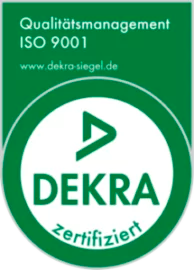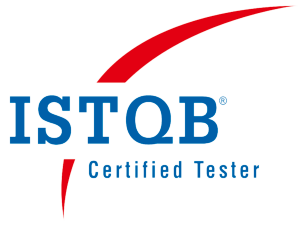Software Testing and QA
RELIABLE QUALITY ASSURANCE FOR YOUR IT PROJECTS
Are you looking for a software testing agency that guarantees the quality assurance of your software with ISTQB certified testers? Then you have found the right partner in the software agency igniti! Because we take great care to ensure that every single software development is tested on a regular basis.
Our ISTQB-certified software testers look over the developers’ shoulders at every step and ensure that you, as our customer, receive flawlessly functional software that is, above all, tailored to the target group. Regular software tests have a preventive effect, increase quality assurance and can prevent errors from occurring in development that would be costly to eliminate afterwards.
igniti’s motto is: better safe than sorry. In this way, we can maintain our QA standard of providing our customers with software that performs to the maximum, meets the desired requirements and, above all, is sustainable. Exceeding expectations is our job and that’s why we love it so much.

Trust igniti’s software tests
We know that even the smallest error in a software can have big consequences, especially in a business environment. That’s why you should never underestimate the value of regular software tests in any development process and rely on a software testing agency whose employees combine the eyes of an eagle and the mind of an owl.
Would you like to know why you should place your software testing in the hands of igniti with complete trust?
Our Trust Factors & Values in Software Testing and QA:
- Certified by TÜV SÜD according to DIN EN ISO9001:2015:
globally recognised seal of approval for qualitative and secure processes in testing. - ISTQB certified software testers
- Efficient test automation with Ranorex, Selenium & more Top lists of test tools
- Agile approach and use of modern approaches such as DevOps and Continuous Delivery
- Perfectly coordinated 8-person QA test team with mixed specialisations for sustainable quality assurance
- 35+ IT experts with extensive software skills and experience from various industries
- Over 40 successfully completed software projects in long-lasting customer relationships
What do the ISO9001 and ISTQB certificates of our software testers mean to you?
Since the beginning, we at igniti have placed the highest value on the fact that our services as a software agency combine quality and innovation. Since 2014, we have had proof that this is also true. With the ISO9001 certificate, TÜV SÜD has confirmed that our quality management system is bearing fruit and that the company meets all possible regulatory requirements for software testing. What does this mean in concrete terms for you as our potential customer?
transparent cooperation and low risk
low costs
high performance
full satisfaction
In short, everyone involved in your software development project at igniti works according to efficient, coordinated QA processes and has high standards to ensure your complete satisfaction with the new product in the end. But we wouldn’t be igniti if we didn’t always put the icing on the cake in quality assurance to create the wow effect for our customers.
In addition to the general quality seal, the majority of our software testers also possess the so-called ISTQB certificate (International Software Testing Qualifications Board). This means that your software is in competent hands with igniti, because ISTQB certified testers undergo a training course, the successful completion of which proves that they are capable of setting up and carrying out test processes according to international standards.


If our tester team encounters a bug in your software (this is the rule), they can reproduce the phase in the test process after fixing the bug and follow up with a regression test. Misjudgements and side effects in debugging are thus a thing of the past. At igniti, even the smallest software bugs are uncovered through thorough analysis, precisely localised and permanently fixed through sustainable QA processes.
The agile software testing approach
MORE SECURITY. LESS COSTS.
As flexible as our individual software development is, we make sure that the end product is at least as secure and error-free. We generate this quality assurance through constant and, above all, agile software testing throughout the entire process. The classic waterfall principle of quality management, in which software is tested for errors only shortly before go-live, is out of the question for us because it involves too much risk. igniti employs well-trained, experienced software testers who are closely involved in the development process in order to monitor it.
Why? Even the best team of developers with the longest experience makes one or more mistakes now and then. This is normal; after all, IT experts are “only” human. What is decisive is how this reality is dealt with. The fact is: those who bring agility into software development and software testing can react more quickly to system errors that occur and save a lot of time and money afterwards.
The release date of your software and the budget of the project are therefore more likely to be met if you opt for igniti’s quality assurance.

Testing at different levels: Simplicity > Complexity
SOFTWARE TEST PYRAMID
If you always look at the big picture in software testing, you probably miss half of it. Here it’s all about detail and individual components that have to be 100% functional in themselves. The test pyramid according to Cohn basically says that a software application is best tested with more simple and fast unit tests and less time-consuming integration or system tests. We adhere to this principle in order to keep the efficiency of your software development as high as possible.
The four basic test levels are determined by the amount of code to be tested and can be categorised as follows:
Unit tests are used to test the behaviour of individual software units, taking into account their internal functionalities. They can be executed in seconds and are also easier to automate, which saves additional time and costs. Integration tests check the interfaces between software components and their interaction. Both test variants are usually the responsibility of our developers.
System tests require more complex technical skills in software testing. Here we check whether the developed software really fulfils the functional requirements defined for its use and whether the quality is at the desired level. Only when our highly trained testers have discovered no more errors and all bugs have been completely eliminated is the software released for commissioning.
The Exploratory Testing approach can be applied in every phase of development. Exploratory testing requires cognitive effort and personal responsibility on the part of the testers. The more they know about the software, the more precisely they can check the quality of the individual functions and formulate precise questions. In explorative testing, we do not adhere to any specific methods, but rely on the competence of our software testers.
Variants of Functional Testing for maximum secure software QA
Every software project is different and therefore has to be considered individually according to the functional requirements. Our specially trained and ISTQB certified software testers always select the appropriate software testing method for quality assurance, depending on the development status and current test objective. In this way, all potentials of your new software solution are utilised, every bug and every dysfunction is completely eliminated through various functional tests. Besides the classification into manual and automated software testing, there are basically four test levels, which are determined by the amount of code to be tested and can be classified as follows:
Manual software testing and software automation: efficiency at its peak.
At igniti, test automation is very important in software development, yet we often debug manually in the first step after implementation, i.e. without a prefabricated tool.
In all subsequent runs (e.g. in regression tests, updates, new features or installation tests), this unit is then repeated each time and automatically tested as well. This way we can be particularly sure that there are no errors in the code. The tools we use for automated software testing are, among others, the best open source QA frameworks on the market – such as Ranorex, Selenium and Appium.


Usability tests: For a trouble-free user experience on any device
No matter who will use the software after completion – we want the usability to be at its maximum and intuitive as well as precise. To achieve this, we conduct regular analytical and cognitive usability tests during the development of your software interface.
The scenario and the target group play a central role here. Whether for a shop system, an embedded system, a mobile device or the desktop interface: igniti’s usability tests ensure that your software is perfectly usable in every detail. With click dummy and beta version, you are welcome to see for yourself before the official release.
Smoke & Performance Tests: From the surface to the bottom
In addition to the above-mentioned manual and automated software test variants, we at igniti also work with so-called smoke tests. In programming, these are the first superficial test runs of new or revised software versions. With smoke testing, we expose simple problems in a code that are still considered hard enough to need to be reworked before a new software build can be accepted for further testing.
When it comes to optimising the response and processing speed, data transfer rate, network bandwidth and throughput, efficiency, and workload reliability of a software system, we perform performance testing. This is primarily concerned with the number of millions of instructions per second (MIPS) at which a mainframe operates.

Black Box Tests vs. White Box Tests
IMPROVING SOFTWARE ITERATIVELY FROM DIFFERENT ANGLES
It is a well-known fact that when you look at things from a new perspective, you always discover something new – this applies to all areas of life, as well as to the testing of a software product. Here, professional testers distinguish between black box testing and white box testing.
While a black box test looks at the software exclusively “from the outside”, i.e. it tests the visible behaviour, a white box test additionally tests the architecture and the code – i.e. the “inner life” of the product. Both approaches offer their own advantages in software QA. By combining the two test variants, cases with a high error probability can be specified and gaps in the implementation can be uncovered. Predominantly, white box testing takes place for individual components, but can also be applied at integration and system level. In any case, Black Box Tests and White Box Tests are indispensable in quality assurance and have always been integrated into the development process at igniti as standard.
Developing sustainable software together -
starting with the first step
THESE ARE YOUR SOFTWARE TESTING AND QA CONTACTS








